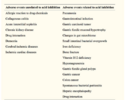I've deleted my last post from the other thread and copied it here because it was getting derailed:
I know quite a bit about how PPIs work. They drastically increase stomach pH, from about ph 1.5 to about ph 5 on average. This is an absolutely huge difference, because the scale is logarithmic, we're looking at more than 1000 times less acidic. I'm not sure such a drastic change to the body's internals is necessary or desirable. Presumably the human stomach is designed to be very acidic for a reason. I would rather take a single antacid two days out of three, for a bit of mild indigestion. And anyway, I'm still only taking about 10% of the amount of somebody who is taking calcium carbonate supplements.
I'm very much in favour of most modern medical practice, but I really do think this is a case of over medication for people with very mild problems like mine. I think a serious outcome like Harry's was very unusual with such mild symptoms.
And there are links to very serious long term side effects (proper ones in medical journals!) after twenty years (+) now of millions of people being prescribed them long term.
Omeprazole and lansoprazole aren't "stronger" lumps of alkali, they're Proton Pump Inhibtors, which reduce the production of acid in the first place, from the specific cells in the stomach.(parietal cells). The ranitidine group do a similar thing in a slightly different way, a histamine thing. Long term taking of PPIs can cause a few things like calcium deficiency, but a lot of peopledo take them long-term.
Gaviscon is carbonates but the Plus/extra versions have the seaweed alginate foam which calms things physically. I had a voice-box funny and was prescribed the latter.
I know quite a bit about how PPIs work. They drastically increase stomach pH, from about ph 1.5 to about ph 5 on average. This is an absolutely huge difference, because the scale is logarithmic, we're looking at more than 1000 times less acidic. I'm not sure such a drastic change to the body's internals is necessary or desirable. Presumably the human stomach is designed to be very acidic for a reason. I would rather take a single antacid two days out of three, for a bit of mild indigestion. And anyway, I'm still only taking about 10% of the amount of somebody who is taking calcium carbonate supplements.
I'm very much in favour of most modern medical practice, but I really do think this is a case of over medication for people with very mild problems like mine. I think a serious outcome like Harry's was very unusual with such mild symptoms.
And there are links to very serious long term side effects (proper ones in medical journals!) after twenty years (+) now of millions of people being prescribed them long term.






